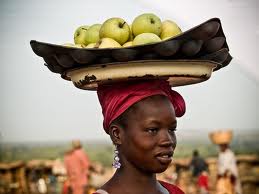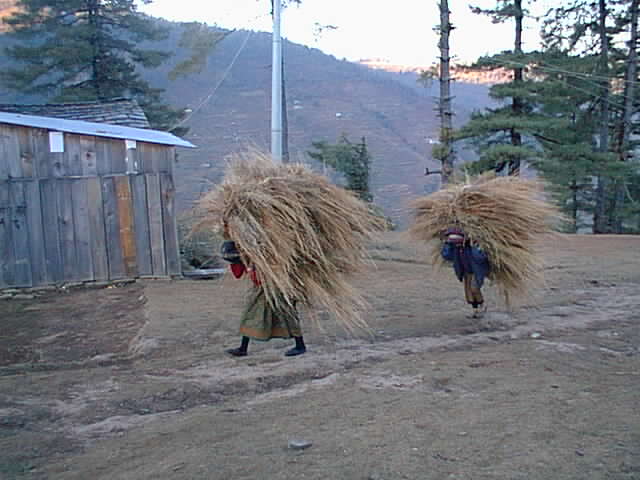
THE LITTLE GRASS-SELLER.
THE Indians and negroes of warm countries carry heavy loads. They acquire great skill and strength in this way, and can support heavy burdens that a white man could hardly lift. Not only do they bear them upon their backs, but even upon their heads. I have had my trunks carried upon the heads of negroes, in the mountains of the West Indies, for many miles. As they practice this mode from the time they can walk, they balance almost any object upon their heads without holding it with the hands. Always, in going to market, they place their produce in a basket, or tray, on the tops of their heads, and walk gaily along, swinging their arms free. Even a small thing, like an apple or an orange, they carry in this way, they have got so in the habit of it. This practice has given them strong necks and broad, straight shoulders.
The Indians, though they can also carry great loads on their heads, yet prefer, as a rule, to carry them on their backs. In Mexico they take the load upon the shoulders, and keep it in place with a broad cotton or leather band around the forehead. They will trot many a mile in this way, and never complain of being tired. I say they will trot; and so they do, for their gait is much faster than a walk.
South of the United States is a country called Yucatan. It pushes itself into the Gulf of Mexico, and lies near to Cuba. Here it was that I saw the men and women used as beasts of burden. Going along the country roads at night, I have met hundreds of them coming into market. Some of them had walked forty miles. By leaving their homes at sunset, they would reach the market-place in the city the next day. They walked in the night, because the scorching sun by day was worse than a load. Not only men and women, but children, boys and girls, carry burdens. Some, not more than ten years old, would have their share to carry.
As little grain is raised there, and only corn is used for food, grass and hay for the cities must be brought from a great distance. The laborers who brought it looked, a little way off; like walking haystacks. You could see only the feet of some of them, the grass covered them so. Even the children brought great bundles. From under some of them sweet girl-faces would look out at me; from others, the faces of little boys, toddling along under as much as they could bear. Some had no clothing on above the waist; some wore simple cotton garments, and carried their hats, if they had any, in their hands. None had stockings, but some wore leather sandals, tied on with rope.
Of course, with so much work to do, these boys and girls cannot have much time for school. They learn very little; but most of them can count, and many can read. The best thing about them is that they are honest and always clean. Their shirts and frocks are coarse, but white, and their manners are good. They seem to show by their behavior that they come from a great people. In truth, learned men tell us that the people of Yucatan were at one time the wisest in America.
They built temples and palaces that now cover many acres with their ruins. No one knows when they were built, but they are great and grand.
Fred. A. Ober.
